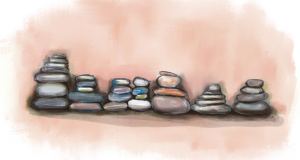
An unconditional basic income for all means that every citizen would get a fixed amount of money, every month or every week. No one moneyless. There's a good case to be made for a global basic income, it would alleviate poverty and even that would already create so much prosperity that it's worth striving for. It's not straightforward to get there, but some ideas are to fund it with through value added tax, and meanwhile get rid of social security and income tax. In return for that every citizen and/or resident gets a fixed amount of money that can cover the rent, food and other basic needs.
The French economist and philosopher André Gorz put it this way:
The connection between more and better has been broken; our needs for many products and services are already more than adequately met, and many of our as-yet-unsatisfied needs will be met not by producing more, but by producing differently, producing other things, or even producing less. This is especially true as regards our needs for air, water, space, silence, beauty, time and human contact.
He continues by adding that we can create the same or even more wealth when working less and that it's not true any more that the more each individual works, the more we're better off altogether. On the contrary. France is currently leading this path with the 35-hour work week and if you add in part-timers you get to an average 27 hours in the Netherlands and 30 hours in France. That's only the start though. Because even with an average 27 hours per week there's not enough work for everyone who wants to work, or rather, for everyone who wants to earn the money linked to this work.
Some advantages of a basic income:
- Automation and technology are taking over jobs. This is a process started by the industrial revolution, during which it led to more work. But in the 21st century we've reached a point were production efficiency is a stronger factor than the creation of new jobs. For example, Kodak employed 140,000 people, while Instagram only employs 13. Of course there are other related jobs, as you need a smart phone to use Instagram.
- Wealthy people are able to save most of their money instead of spending it. Partly this can be a good as it allows for capital to put aside for larger investments, but the net effect today is that money is taken out of circulation and flowing into tax havens. The poor usually spend most or all of their money. And society needs to spend more, not less, to get the economy started again. A basic income does not harm the wealthy, since most of the money will be spent and end up with someone who has invested or saved money.
- A basic income system does away with the entire bureaucracy around current social welfare systems. There's no need to filter out or even punish abusers. There simply won't be abuse anymore. At the same time the tax system can be largely simplified. In many countries the tax authorities are (one of) the biggest government organ. Lean Government people and even Tea Party folks could rejoice.
- The current public retirement pensions are a form of generational theft. People who are currently starting their first jobs will be paying a lot for this form of social security and receive little or even nothing.
- Poverty reduction leads to crime reduction.
- More balance in the labour market. People don't need to work because of poverty. "Shitty" jobs are likely to be better paid. "Fun" jobs will be paid less.
- It'll be much easier to start a business. Much less worry about getting a first paying customer, or in some countries, no more pressure from social security.
- Automatic social justice. No need for charity or welfare.
Sign the European Citizens' Initiative
If you're an EU citizen Sign the petition for an exploration of basic income within the EU.
More information
- http://www.basicincome.org
- "You don't need a tax to pay for a basic income."
- https://www.greshm.org - The mission of Project Greshm is to deepen the intellectual discussion of basic income (UBI).
- https://www.facebook.com/ECI.BasicIncome
- https://www.youtube.com/watch?v=aIL_Y9g7Tg0
- http://citizensincome.org/book-reviews/chris-hughes-fair-shot/
- https://medium.com/basic-income/the-monsters-inc-argument-for-unconditional-basic-income-3b22b63eed3e






